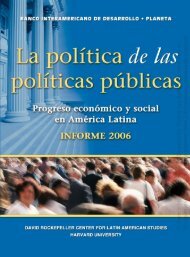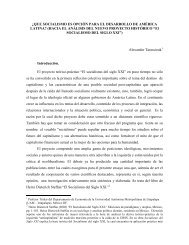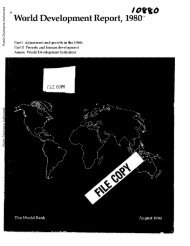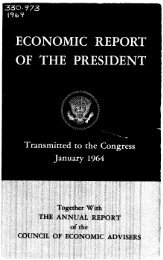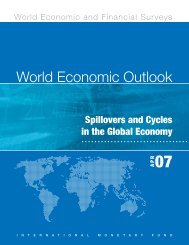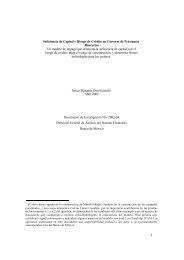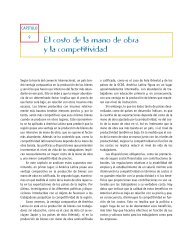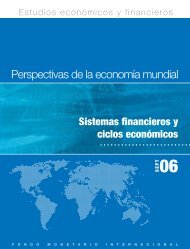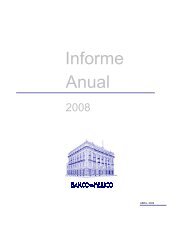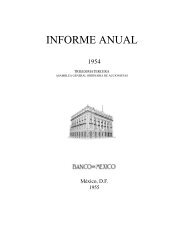World Bank Document
World Bank Document
World Bank Document
You also want an ePaper? Increase the reach of your titles
YUMPU automatically turns print PDFs into web optimized ePapers that Google loves.
Box 2.4 The changing nature of debt renegotiations<br />
There are two main institutional arrangements for debt that are willing to take steps to address their problems.<br />
relief: the Paris Club for debts to or guaranteed by gov- The Paris Club has worked best, however, for counernments;<br />
and ad hoc consortia of commercial banks tries where temporary liquidity difficulties were due<br />
(sometimes called the London Club) for uninsured debts principally to a bunching of debt service payments. The<br />
to financial institutions.<br />
Paris Club has been less successful in resolving the difficulties<br />
of countries, such as those in sub-Saharan Africa,<br />
The Paris Club<br />
where debt service difficulties are related to structural<br />
The Paris Club was born in 1956 when a group of creditor economic problems. When prospects for restoring norcountries<br />
met in Paris to renegotiate Argentine debt mal debt service are dim for many years, successive<br />
owed to export credit guarantee institutions, which had annual reschedulings of payments for a decade often has<br />
reimbursed private creditors following delays in Argenti- served only to postpone the problem. The flexibility that<br />
na's debt service to them. Although the club has no writ- the Paris Club has demonstrated provides the basis for<br />
ten rules, it has evolved a standard approach based on expecting that it will adapt its practices to address these<br />
experience and precedent, one objective being equitable problems as well.<br />
treatment of all creditors.<br />
The scope of the club's debt relief covers service on all Commercial bank debt<br />
bilateral official loans, including concessional credits and By contrast to the Paris Club, arrangements for renegotiofficially<br />
guaranteed export credits. Consolidation peri- ating debt owed to commercial banks have developed<br />
ods are normally for one year, but successive agreements only since the late 1970s (see Box figure 2.4A). Since<br />
are common: debt relief has been extended more or less much of this debt consists of syndicated loans, as well as<br />
continuously during the past decade to Liberia, Senegal, uninsured trade or project finance, and the number of<br />
Sudan, Togo, and Zaire. Previously rescheduled debt creditor banks may be in the hundreds, the banks are<br />
has been consolidated when circumstances required. represented by an "advisory" committee that negotiates<br />
Debt relief is normally restricted to current maturities. with the government of the debtor country. An agree-<br />
The proportion typically rescheduled varies from 80 to ment, when reached, must be approved by each creditor<br />
100 percent. This consolidated portion is repaid over bank. The process has become increasingly streamlined<br />
eight to ten years, with a grace period of four to five in the 1970s, with small advisory committees now the<br />
years. For countries with severe balance of payments rule and with coordinated actions to seek rapid agreeproblems,<br />
the nonconsolidated portion may be repaid ment from all participating banks.<br />
over the grace period; in such cases, debt relief ap- Commercial banks reschedule mainly current maturiproaches<br />
100 percent of eligible maturities. Arrears are ties of long-term debts, and occasionally arrears of prinoccasionally<br />
rescheduled, but they are normally repaid at cipal as well. They do not reschedule interest; any<br />
a faster rate.<br />
arrears of interest must be settled before rescheduling<br />
The Paris Club arrangements help restore normal trade agreements become effective. Some agreements have<br />
and project finance to debtor countries. When the debtor consolidated short-term debts. In many recent reschecountries<br />
experience severe international liquidity diffi- dulings, fresh long-term loans and trade credit facilities<br />
culties resulting in a breakdown in relationships with have been extended as part of a debt relief package, in<br />
their creditors, a Paris Club agreement sets the frame- effect offsetting interest payments. The negotiations<br />
work for rescheduling arrears to official creditors and have been flexible; some have arranged year to year<br />
clears the way for direct or guaranteed new credits. It is deferments of debt while comprehensive longer-term<br />
followed by bilateral agreements with each of the partici- agreements were still being discussed. Repayment of<br />
pants in the Paris Club meeting within the agreed frame- consolidated debt typically ranges from six to nine years,<br />
work. After bilateral agreements are concluded (some- including two to four years of grace. Interest charges<br />
times a lengthy process), each agency concerned restores vary from a margin of one and seven-eighths to two and<br />
export credit cover to the rescheduling countries. one-half points over LIBOR. Debt rescheduling is nor-<br />
Indeed, debtor countries can approach the Paris Club mally accompanied by a commission charge of 11/4 to 11/2<br />
even before encountering liquidity problems that would percent.<br />
lead to the cessation of trade finance; ideally, they Year to year rescheduling has effectively overcome<br />
should do so. The Paris Club requires that debtor coun- immediate debt-servicing difficulties, but it leaves uncertries<br />
take prompt and effective measures to address their tainty over the debtor's future position, which can preunderlying<br />
economic problems; an IMF-supported vent its returning to normal market financing. In Mexiadjustment<br />
program that will give a country access to the co's case, the commercial banks signed an agreement in<br />
upper credit tranches is, typically, a prerequisite to a March 1985 to consolidate public sector debt falling due<br />
Paris Club agreement. The Paris Club, while still consid- in 1985-90 and to accept repayment over fourteen years,<br />
ering debt relief mainly in the context of short-term with lower spreads for the early years of the repayment<br />
liquidity problems, has shown flexibility in its response period and no restructuring fees. Recently a multiyear<br />
to the debt-servicing problems of developing countries (continued)<br />
27



